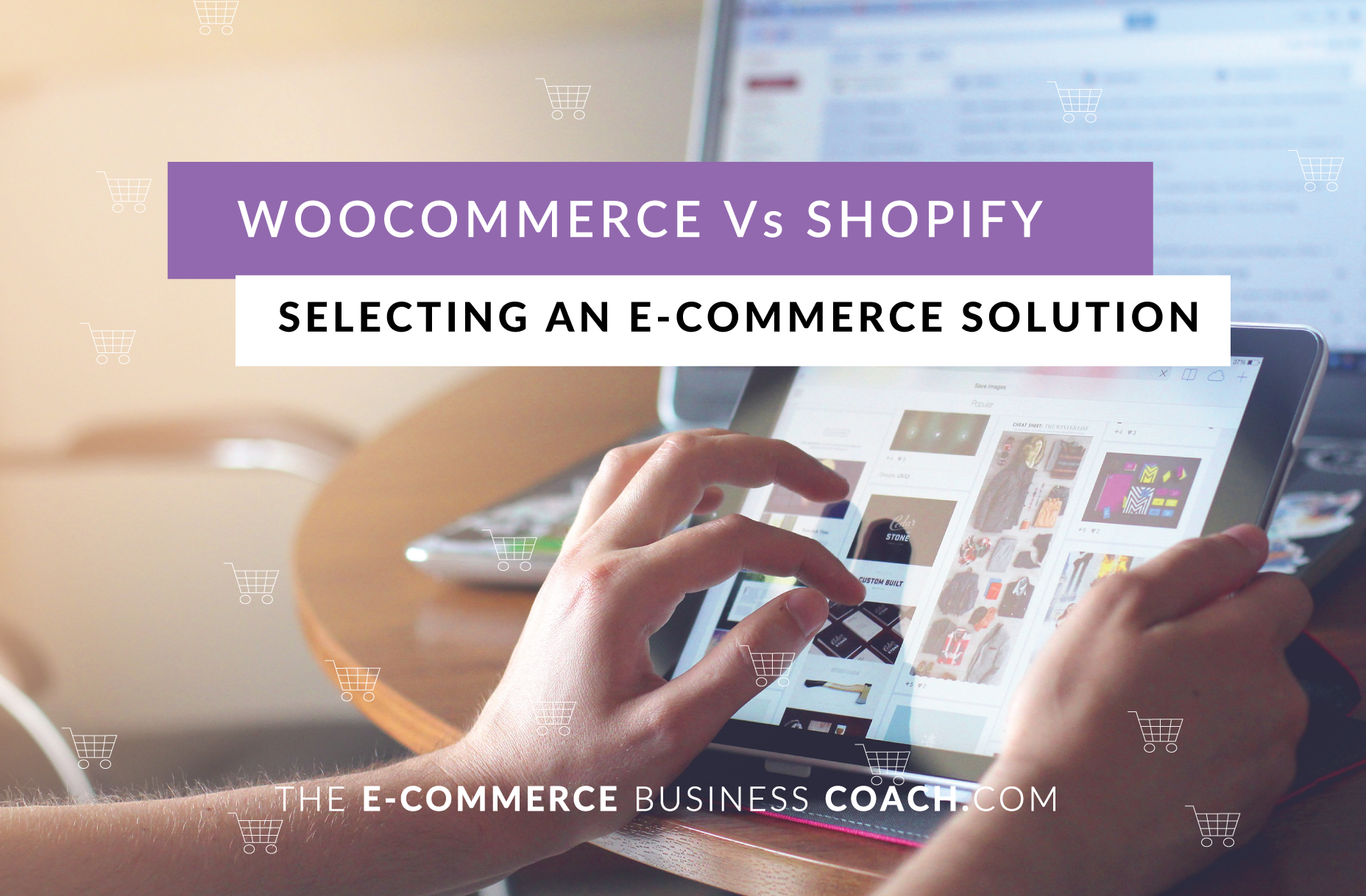
Woo-commerce vs Shopify selecting the best eCommerce solution for your online store
Things to think of when choosing an E-commerce solution
WHAT’S UNIQUE ABOUT EACH E-COMMERCE PLATFORM?
Shopify is an all-in-one solution which enables you to create an online store, manage your products, and handle payments using a single service.
WooCommerce is an open-source solution built on top of WordPress, which supercharges the Content Management System (CMS) and enables you to run an online store using the platform you know and love.
Budget
Some platforms are available for free but require you to purchase ongoing hosting to host the store, whereas others adopt a SaaS (Software as a Service) model where you pay monthly to use the platform.
Content management and blogging capabilities
A store alone can be quite difficult to improve search engine rankings for. That’s why many stores have additional pages of content, or even a blog. No two content management systems are the same, so selecting a platform that you like, that is built with functionality to promote good search engine optimisation, and is easy for you to use is crucial.
Offline sales and inventory management
Simple e-commerce platforms can be quite limited in functionality, especially for things such as inventory management or offline sales. If your products are made to order or inventory is managed through another system, this isn’t really required. However, integrating your stock management into your online store is a great way to consolidate your systems.
The ability to process offline sales is a great way to incorporate your online store with your brick-and-mortar store.
User-friendliness
Depending on how tech savvy you are, you may want to choose a platform with powerful functionality that has a less user-friendly interface. Ease of use is important if you’re hoping to step up a shop by yourself for the first time. However, this come sometimes come at a cost, or limit your store’s functionality.
Customer Support
As mentioned before, if you’re hoping to set your online store up yourself, you should be sure to pick a platform with decent customer support.
Now that you know about some of the factors that will influence which platform you choose, let’s look at some specific platforms. In this post, we’ll be looking at WooCommerce, and Shopify.
Both platforms are excellent out-of-the-box solutions for small to medium-sized stores that can help you get an e-commerce store up and running fairly quickly.
Shopify
Shopify is a great E-commerce platform for getting simple stores up-and-running in no time at all. It’s a stand-alone, cloud-based platform that boasts unlimited bandwidth and transactions, and integrates with other 70 external gateways around the world.
Here are a few features that Shopify offers out of the box:
- Customisable options for the look and feel of your store
- Over 100 professional store templates and themes available
- Display products organised by categories
- No limit on how many products you can sell
- Over 70 external payment gateways available such as Bitcoin, PayPal, and iDEAL
- Shopify is certified Level 1 PCl compliant and transactions are secure
Shopify offers all the features you need to get your simple online store up-and-running as soon as possible. It’s perfect for those with limited technical experience and just want to start selling online.
Pros & Cons
Let’s find out some of the positive and negative features of using Shopify as an e-commerce platform for your store.
Pros
- Integrated with many payment gateway providers
- Great features to help improve Search Engine Optimisation such as editable title tags and meta descriptions on categories.
- Good for small to medium-sized businesses
- Automatic updates
- Offers free hosting
- Intuitive admin area interface
- Flexible shipping rates and automatic taxes
- Ability to create customer accounts and profile groups
Cons
- Shopify’s blogging platform offers very basic functionality compared to WordPress.
- Shopify makes it difficult to migrate to another e-commerce platform, should you decide to change in the future
- Limited multi-language support limits scalability
- Isn’t capability of one-page-checkout
- Cheaper plans don’t include real-time shipping or discounts
- Limited to 100 product variations
- Limited ability for customisation
For a quick and easy solution that you can do yourself, Shopify is a great solution for your E-commerce store. Simple stores would benefit from the quick setup and ease-of-use of a Shopify E-commerce platform.
WooCommerce for WordPress
WooCommerce is an e-commerce plugin developed to integrate seamlessly with WordPress. It is an open-sourced solution, meaning that there are developers all over the world contributing to the extensive codebase and developing free and paid extensions for pretty much any custom functionality you may need.
Let’s explore some of the features that WooCommerce offer out of the box:
- Built for WordPress
- Sell a number of different product types, including real products, digital downloads, subscriptions, content, and time
- No limit on how many products you can have
- Mobile friendly themes are abundantly available
- As you host the site yourself, all data and code is yours meaning you’re not locked into a platform
- Free and paid extension marketplace with over 300 free and paid extensions to choose from
Pros & Cons
Let’s weigh up the positive and negative aspects of using WooCommerce as an e-commerce solution for your online store.
Pros
- Pretty easy to use once you’re familiar with WordPress
- Fully customisable
- Unlimited products & product variations
- Built-in payment gateways, including PayPal, BACS, and Cash on Delivery
- Provides total control of the checkout process
- Geo-location support to detect location and updating shipping costs
- Automatic taxes and flexible shipping rates
- Shipping and cart calculators available
- Simplified discount code system with the ability to enable and disable discount codes easily
Cons
- Store security relies on regular updates
- Requires WordPress
- Requires you to purchase you own hosting
- Custom functionality may require the purchase of premium plugins
SHOPIFY VS WOOCOMMERCE: WHICH ONE IS RIGHT FOR YOU?
We’ve made it to the end of the Shopify vs WooCommerce brawl, and now it’s time to determine which platform is best for you:
- Shopify is the way to go for users who don’t want to deal with a complicated setup process and need premium support. The service guarantees a smooth ride at the expense of a monthly subscription. Of All my clients that I see use Shopify – they simply fly. The integration with eBay, Amazon is amazing. Facebook Ads are easy and the app capability is amazing.
- WooCommerce can go head to head with Shopify and come out on top due to its inherent flexibility. However, its setup process is a bit more complicated and will require you to get your hands dirty. It’s perfect for those of you who have an affinity for open-source software and want to customize every aspect of your experience. It also requires web development assistance when required.
When you’re ready to grow your e-commerce business, here are 3 options to start and scale your e-commerce store.
1. Want professional help in setting up and optimizing your Facebook™ Ad campaigns? Learn more here
2. Apply for 1:1 VIP e-commerce coaching– My High-level, Growth, strategy and my done-with-you 1:1 e-commerce coaching programs.
2. The E-Commerce Business Owners Mastermind – Growth, strategy and community of amazing e-commerce business owners, starting and scaling their brands!
